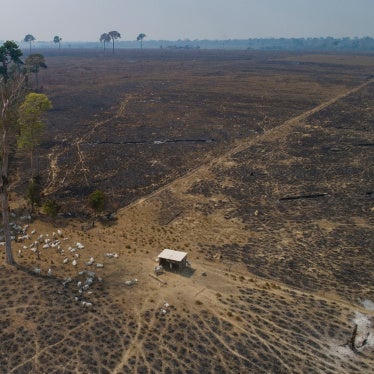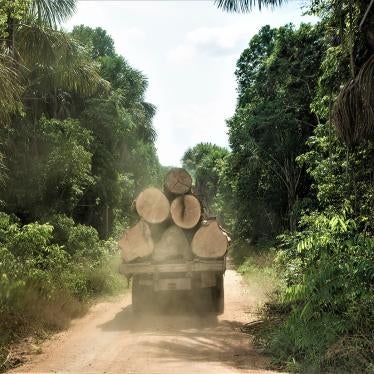Dear Governors,
We are writing to applaud the commitment the Governors, through the Interstate Legal Amazon Consortium, have made to fight illegal deforestation in the Amazon and to share our recommendations regarding the urgent, short-term steps that we believe your states should take to meet it. Human Rights Watch strongly supports your efforts to seek international cooperation to address the Amazon crisis. And we have advocated for international assistance to be provided directly to those state governments that are able to demonstrate progress—measured in concrete results—in reducing deforestation and ending impunity for environmental crimes and acts of intimidation and violence against forest defenders within their jurisdictions.
Human Rights Watch is an international nongovernmental organization that monitors and reports on human rights issues in more than 100 countries around the world—including, among others, those associated with environmental degradation and climate change, abusive and unsustainable business practices, and infringements on the rights of Indigenous peoples. We have staff in 40 countries, including offices in Washington, DC; New York; Berlin; Paris; and São Paulo.
Human Rights Watch has done extensive reporting on the environmental and human rights crisis in the Brazilian Amazon. In 2019, we published a report documenting a systematic failure by authorities to properly investigate and prosecute acts of violence linked to illegal deforestation. In 2020, in partnership with the Amazon Environmental Research Institute (IPAM) and the Institute for Health Policy Studies (IEPS), we produced a report documenting how deforestation-related fires had poisoned the air breathed by millions of Brazilians and led to thousands of hospitalizations for respiratory diseases. We have also documented the failure of federal agencies to enforce penalties for environmental infractions and curb illegal mining and violence in Indigenous territories.
Since 2019, Human Rights Watch has reported on how the federal government has sabotaged the country’s environmental law enforcement agencies, harassed and sought to marginalize civil society organizations, and weakened the protection of Indigenous territories. While illegal deforestation and associated violence are longstanding problems in the Brazilian Amazon, the situation has grown dramatically worse under the current government, whose anti-environmental rhetoric and policies have effectively given a green light to the criminal networks that are driving much of the illegal logging, mining, and land invasions.
The mounting destruction of the rainforest has tarnished Brazil’s image and competitiveness abroad. The European Union has indicated the Amazon crisis is a major factor in the delay in the ratification of the association agreement with Mercosur, for example. Failure to address the crisis has also hindered the country’s aspirations to become a member of the Organization for Economic Cooperation and Development, and investment funds and supermarkets have threatened to boycott Brazilian agricultural commodities linked to deforestation.
Given the federal government’s record, and given the crucial role that state-level agencies play in fighting illegal deforestation and protecting the rights of local populations, Human Rights Watch has urged the US government to engage with the Consortium in the design and implementation of assistance programs to the Brazilian Amazon, and to offer assistance directly to the states to support your efforts to address the crisis.
In April, the United States, the United Kingdom and Norway along with major businesses launched the Lowering Emissions by Accelerating Forest finance (LEAF) Coalition. The coalition is pledging at least US$1 billion to pay jurisdictions, including subnational governments such as the Amazon states, that can demonstrate they are reducing greenhouse gas emissions from tropical deforestation and forest degradation, which effectively requires them to reduce deforestation rates.
To be eligible for funding, the Coalition says, jurisdictions must ensure the “full and effective” participation of Indigenous peoples and local communities and uphold land tenure rights in their deforestation reduction projects. It our understanding that, after welcoming the initiative, some Amazon states have taken steps towards submitting applications.
Citing Human Rights Watch research, in April 15 US senators–including the chairs of Senate committees that play a major role in shaping foreign policy–made clear in a letter to President Joe Biden that any such assistance should be conditioned on Brazilian authorities making significant and sustained progress on reducing deforestation and ending impunity for environmental crimes and acts of intimidations and violence against forest defenders. Subsequently, US Special Presidential Envoy for Climate Change John Kerry and US Secretary of State Antony Blinken have echoed the call for results.
It seems increasingly clear that states will have to address human rights issues in conjunction with efforts to reduce deforestation to be eligible for funding, and they will have to demonstrate concrete progress.
We are encouraged that the Consortium is seeking to build alliances with the international community to support conservation and sustainable development that benefits the millions of Brazilians residing in the Amazon. We welcome the progress made in several states in curbing deforestation, and the initiative that some state governments have taken to seek to increase the sustainability of agricultural commodities produced in the Amazon. We also consider crucial that some states have developed and maintained their own programs for the protection of environmental and human rights defenders at risk.
Yet much remains to be done. According to the National Space Research Agency (INPE) PRODES monitoring system, in 2020 more than 11,000 square kilometers of rainforest were lost, nearly triple the 3,925 square kilometers target that Brazil committed itself to reaching by 2020 as part of its National Climate Change Policy. The most recent preliminary estimates by INPE’s DETER monitoring system indicate that between January and May 2021 roughly 2550 square kilometers were deforested, a 25 per cent increase in relation to the same period last year. Recent, serious acts of violence and threats against Indigenous forest defenders in the Tapajós basin and the Yanomami Indigenous lands, even in the face of law enforcement operations against illegal mining, also show the extent to which criminal groups driving the destruction of the Amazon feel emboldened—and the work that authorities must do to counter this prevailing sense of impunity.
Human Rights Watch has identified a range of urgent policy measures that we believe your states will need to adopt to reverse the trend of accelerated deforestation and impunity for environmental crime within your respective jurisdictions. These measures are also conceived with the understanding that state governments are operating with limited resources that have been strained by the Covid-19 pandemic, and thus consist largely of political decisions that could be executed at your discretion with existing or moderate resources. These measures include the following:
- Make Animal Transit Guides (GTA) public to increase transparency of the cattle supply chain and curb invasions of Indigenous territories and protected areas;
- Annul registries of private properties that illegally claim ownership of land within Indigenous territories and public forests; and
- Instruct state police to respond promptly to acts of violence and intimidation linked to illegal deforestation and other environmental crimes, and ensure that these crimes are thoroughly investigated.
We also urge the Consortium to convene the relevant authorities within their states— including civil and military police, public prosecutors’ offices and environmental agencies—to develop a coordinated strategy for dismantling criminal networks linked to illegal deforestation and violence against defenders in their jurisdiction. In addition, states should strengthen or create programs for the protection of human rights defenders at risk, ensuring adequate representation of Indigenous peoples and civil society in their governance structure.
We explain each of these recommendations in detail in the annex we are attaching to this letter, which we will also be sharing with the prospective donor countries that we hope might support your efforts. We strongly believe that by implementing these measures in an urgent and rigorous fashion, your states will be able demonstrate leadership on this crucial issue and deliver the kind of results that will be necessary to garner international support for your efforts.
We look forward to continued engagement with the Consortium.
Sincerely,
Maria Laura Canineu
Brazil Director
Human Rights Watch
Daniel Wilkinson
Environment Director
Human Rights Watch







